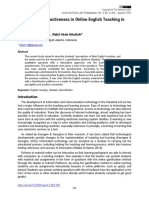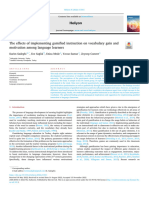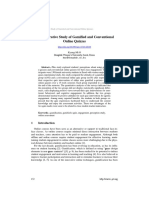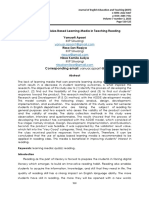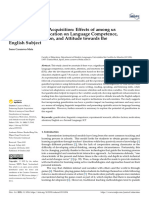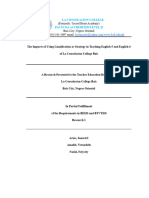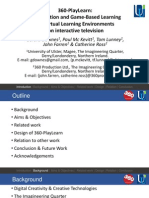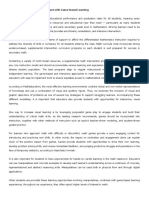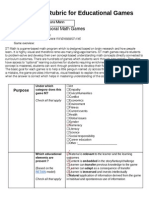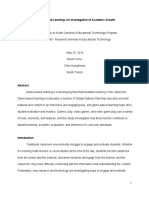Journal of Education and Teaching Learning (JETL)
Volume 6, Issue 2, May 2024
Journal Homepage:
http://pusdikra-publishing.com/index.php/jetl
Students Perception of Gamified Learning in EFL Class : Online Quizizz for
Engagement and Motivation
Nazli Fahada1, Nurmahyuni Asrul2
1,2 Universitas Prima Indonesia, Indonesia
Corresponding Author : nazlifahada@gmail.com
ABSTRACT
This study investigated gamified learning, particularly online quizizz,
in EFL (English as a Foreign Language) One digital educational game
that is gaining popularity is quizizz, a game-based online test that
enables entertaining multiplayer teaching activities and allows learners
to practice with their devices. This study aimed to examine students'
perceptions of the use of quizizz on student motivation and
ARTICLE INFO engagement. A descriptive quantitative research design was used in
this study, in which data were collected from questionnaires to gain
Article history:
insight into how quizizz affected the aspects of motivation and
Received engagement. The questionnaire data were analyzed using descriptive
25 March 2024 statistics. The study found that quizizz significantly increased
Revised students' motivation to learn English, with the interactive nature of the
15 April 2024 platform being a key factor in boosting their enthusiasm for language
Accepted learning. Despite a minority of respondents finding quizizz boring, the
20 May 2024 majority reported enjoying the platform's gamified approach to
learning and felt more active and engaged during classes where
quizizz was utilized. Additionally, participants acknowledged
quizizz's substantial contribution to their knowledge of English
vocabulary and grammar. Moreover, the study found that quizizz
positively shaped students' perceptions of online learning, its potential
to enhance digital learning experiences and enhance student
engagement in english learning. The findings underscore the beneficial
effects of quizizz on student motivation and engagement.
Key Word Quizizz, Gamification, EFL Class, Educational Applications
How to cite https://pusdikra-publishing.com/index.php/jetl
Doi 10.51178/jetl.v6i2.1828
This work is licensed under a
Creative Commons Attribution-ShareAlike 4.0 International License
INTRODUCTION
Technology is playing an ever-increasing role in the lives of today's
children, both inside and outside of the classroom, and it is empirically proven
to be effective in assisting students to comprehend difficult concepts and foster
peer collaboration (Arifin & Setiawan, 2022). Due to the benefits of information
and communications technology (ICT), modern educational theory
recommends that teachers incorporate technology into their instructional
142
�Journal of Education and Teaching Learning (JETL)
Volume 6, Issue 2, May 2024
Page 142-151
practices. As a result, the expansion of ICT technology has influenced the
growth of the games industry, particularly educational games, enabling
educators to be more innovative in the design of the learning process (Ika
Dhamayanti, 2021). Some game designers have a background in psychology or
other fields that examine motivation and student behavior in greater depth. The
term “gamification” in learning is a recent innovation in the field of education.
It is believed that gamification increases students' motivation and achievement
in learning by increasing their interest in studying.
Gamified learning, characterized by the integration of game elements into
educational activities, has garnered attention for its potential to enhance
student motivation, retention, and overall learning outcomes. With in this
framework, Gamified learnings emerge as a versatile tool that not only assesses
comprehension but also serves as a catalyst for student engagement and active
learning. Gamified learning, which is used to increase learner engagement and
motivation, is still in its infancy (Rivera & Garden, 2021). Gamification uses
game concepts such as badges, points, levels, and leaderboards to engage and
motivate individuals to complete a variety of tasks. In education, gamification
has gained widespread popularity, especially in English language teaching and
learning. One of the English language learning materials that makes extensive
use of technology, particularly gamification, is vocabulary, since building a
useful vocabulary is essential when studying a foreign language.
According to (Yunus & Hua, 2021), teachers these days are ‘forced’ to shift
their pedagogy practices as these practices are much influenced by an ever-
updating technology. Online gaming is becoming a preference for millennials
due to its mobility, flexibility, and versatility, as well as providing interaction
without borders. Gamification was brought to educational prominence by
(Permana et al., 2023) whose work led to the creation of various interactive
applications for learning, including quizizz, kahoot!, quizlet, and plickers.
(Munawir , 2021) In the results of his research there has been an interest in
understanding how students’ motivation and engagement influence their
learning. Educational games and gamification in particular contexts are applied
to support the development of students’ motivational, emotional and social
outlook.
Online interactive games provide opportunities for learners to be
independent seekers of knowledge as well as to equip themselves with relevant
skills in the current lifestyle of humankind, which is gradually revolving
around the world of ICT. (Nadeem et al., 2023) state that game-based learning
can make learners become the center of learning and make the learning process
easier, more interesting, and more effective. This is in line with the principles of
143
�Journal of Education and Teaching Learning (JETL)
Volume 6, Issue 2, May 2024
Page 142-151
twenty-firstcentury learning, which places great emphasis on student-centered
learning and promotes the use of learning experiences that are fun and
engaging. One of the popular digital educational games used is quizizz. The
results of data analysis for July 2021 showed that this quizizz web is ranked as
the seventh most visited web for the science and education category. Previous
research has shown that quizizz was effective in improving students'
vocabulary and grammatical mastery in the English classroom (Permana et al.,
2023) and also improved most English students' grammar understanding
(Rahayu & Purnawarman, 2019). In the era of the covid-19 pandemic, where
learning must be delivered online, the use of quizizz as a learning tool is a
necessity, both in synchronous and asynchronous learning.
Quizizz is a game based online test tool that enables entertaining
classroom activities and is conducted jointly. With this application, students can
work on the given questions interactively through their gadgets. Students could
get a better experience in learning and can compete with their classmates. With
quizizz, students complete the work at their own pace and therefore remain
highly engaged throughout the quiz (Brunat, 2018). Students’ interest and
participation in learning can be stimulated by quizizz (Zhao, 2019) and quizizz
is very well suited to be used as a formative test tool, as after completing
quizizz, the test report can be downloaded and the student performance can be
rated. quizizz is available online at https://quizizz.com. It is an excellent online
test tool that students can use to check their knowledge and learning progress.
quizizz is a suitable tool to get information about what the general class
condition is like in the understanding of the students about the learning
materials.
Quizizz represent a fundamental component of gamified learning, serving
as versatile tools to assess comprehension, reinforce learning objectives, and
stimulate critical thinking skills (Amiro, 2023). By integrating quizizz into
EFL(English as a Foreign Language) instruction, educators can create
immersive learning environments that captivate students' interest and
encourage their active involvement in the learning process. This exploration
delves into the multifaceted benefits of utilizing quizizz within gamified EFL
(English as a Foreign Language) education. From enhancing retention of
language concepts to fostering healthy competition among students, quizizz
serve as dynamic mechanisms to promote deeper engagement and participation
(Syafriafdi, 2023). Moreover, the immediate feedback provided by quizizz
empowers students to assess their progress, identify areas for improvement,
and take ownership of their learning journey.
144
�Journal of Education and Teaching Learning (JETL)
Volume 6, Issue 2, May 2024
Page 142-151
This Study examines the potential benefits of quizizz in EFL teaching
materials, including its ability to personalize learning experiences, facilitate
contextualized language practice, and promote collaborative learning among
students. Furthermore, it explores how Application quizizz can cater to diverse
learning styles and preferences, accommodating visual, auditory, and
kinesthetic learners alike. Moreover, this study investigates the role of quizizz
in promoting active learning strategies, such as problem-solving, critical
thinking, and experiential learning. By immersing students in interactive
scenarios and real-life contexts, quizizz enhanced EFL materials encourage
active participation and empower learners to construct meaning through
exploration and experimentation. Through an analysis of existing literature,
case studies, and empirical evidence, this Study aims to provide insights into
the potential of quizizz for EFL instruction, fostering greater student
engagement, motivation, and ultimately, language proficiency. This Research
explores the implications of utilizing quizizz in EFL teaching materials,
focusing on student engagement and motivation.
RESEARCH METHODE
This study was descriptive quantitative research. Descriptive designs are
non experimental because they do not require intervention or treatment. They
generally aim to provide information about key parameters without testing
hypotheses. This study aimed to Enhancing Students Engagement and
Motivation of the usage of quizizz in EFL (English as a Foreign Language)
Learning. The participants were first-year students at the University of Prima
Indonesia, Medan, Indonesia. The participants ranged from 18 to 20 years of
age and learned the same English topics and materials. The participants were
instructed to answer all items on the questionnaire honestly and share their
views on using quizizz as a tool for learning English. A total of thirty-five
participants provided responses. The questionnaire data were analyzed using
descriptive statistics. It comprised 10 statements rated on a five-point scale: 1
for "strongly disagree", 2 for "disagree", 3 for "neutral", 4 for "agree", and 5 for
"strongly agree".
Table 1.
Detail of Participants
Variable Value Frequency Percentage
Gender Male 11 31
Female 24 69
Age 18 16 46
19 17 6
20 2 48
145
� Journal of Education and Teaching Learning (JETL)
Volume 6, Issue 2, May 2024
Page 142-151
RESULT AND DISSCUSSION
This section discusses the data collected in this research regarding the use
of quizizz as a catalyst for improving students motivation and in-class
performance. Based on the data processing, we could divide the data into the
following two categories: Students' levels of engagement and motivation.
To illuminate more profound focuses in students' recognitions, the
analysts executed the survey after utilizing quizizz as the platform device for a
few months. The discoveries of the survey are displayed in Table 2 below.
Thirty five students filled it in. Most of the understudies utilized smartphones
to get to quizizz, but a few utilized computers to get to it. Their answers to the
articulations within the survey were given in presentages.
Table 2.
Result for Students’s Engagement and Motivation Item in the Survey
SD D N A SA Total
No Item
Precentage ( % )
I find it is interesting to use quizizz to
1
learn English. 0 10 5,67 40 44,33 100
Quizizz increased my motivation to
2
learn English. 0 0 4,33 30 65,67 100
Using quizizz to learn English was
3
boring for me. 56,67 30 7,67 5,66 0 100
Quizizz contributed greatly to my
4
knowledge of English vocabulary. 0 0 5,67 34 60,33 100
Quizizz contributed greatly to my
5
knowledge of English grammar. 0 0 6,66 26,67 66,67 100
6 Learning English with quizizz! is fun 0 0 3,64 36,36 60 100
7 I enjoyed the class with quizizz! 0 6,67 0 76,67 16,66 100
I feel more active in the class with
8
quizizz! 0 10 6,67 40 43,33 100
9 I found it difficult to use quizizz 43,33 47 4 5,67 0 100
Quizizz! has positively shaped my
10
perception of online Learning 0 3,33 6,67 46,67 43,33 100
The survey results show various perceptions from respondents regarding
the use of quizizz in English learning. Of the ten statements submitted, here are
some of the main findings:
1. I find it is interesting to use quizizz to learn English.
146
�Journal of Education and Teaching Learning (JETL)
Volume 6, Issue 2, May 2024
Page 142-151
A majority of respondents (84.33%) indicated that they find it interesting
to use quizizz for learning English. This suggests that the platform is
capable of capturing students' interest in learning.
2. Quizizz increased my motivation to learn English.
Interpretation: The majority of respondents (95%) indicated that quizizz
boosts their motivation to learn English. This demonstrates that the
interactive nature of quizizz has a positive impact on students'
motivation levels, encouraging them to actively participate in learning
activities.
3. Using quizizz to learn English was boring for me.
While a minority of respondents (56.67%) found quizizz boring for
learning English, the majority (86.67%) did not share this sentiment. This
indicates that while quizizz may not appeal to everyone, it generally
succeeds in keeping students engaged and interested.
4. Quizizz contributed greatly to my knowledge of English vocabulary.
Nearly all respondents (94.33%) agreed that quizizz significantly
contributes to their knowledge of English vocabulary. This highlights
quizizz's effectiveness as a tool for reinforcing and expanding vocabulary
skills.
5. Quizizz contributed greatly to my knowledge of English grammar.
Similarly, the majority of respondents (93.34%) acknowledged quizizz's
substantial contribution to their knowledge of English grammar. This
underscores quizizz's efficacy in enhancing grammar comprehension
and proficiency.
6. Learning English with quizizz! is fun.
A vast majority of respondents (96.36%) agreed that learning English
with quizizz is enjoyable. This indicates that quizizz's gamified approach
to learning resonates well with students, making the learning process
enjoyable and engaging.
7. I enjoyed the class with quizizz.
The majority of respondents (93.33%) expressed enjoyment in classes
where quizizz was used. This suggests that quizizz enhances the overall
classroom experience, fostering a positive learning environment.
8. I feel more active in the class with quizizz!
Most respondents (86.67%) agreed that quizizz makes them feel more
active in class. This suggests that quizizz promotes active participation
and engagement among students during lessons.
147
�Journal of Education and Teaching Learning (JETL)
Volume 6, Issue 2, May 2024
Page 142-151
9. I found it difficult to use quizizz.
While a significant portion of respondents (47%) found quizizz
challenging to use, it's important to note that the majority did not share
this sentiment. This indicates that while there may be some usability
issues, quizizz generally remains accessible to most users.
10. Quizizz! has positively shaped my perception of online Learning.
The majority of respondents (89.33%) agreed that quizizz positively
influences their perception of online learning. This highlights quizizz's
role in enhancing the online learning experience, potentially encouraging
students to embrace digital learning platforms more readily.
The finding showed that students gained much more improvement in
their motivation, interest, willingness and the contribution of quizizz to their
EFL (English as a Foreign Language) class (items 1, 2, 6,, and 7). They felt
interesting to use quizizz as their learning media. They were also motivated to
learn and practice English better. Quizizz contributed to gaining and increasing
their knowledge in vocabulary and grammar. Participants reported using
quizizz promoted interactivity and engagement during classes, through
answering questions, contributing to quizizz. The use of quizizz Encouraged
greater engagement in class as compared to the traditional classroom where a
few students frequently feel bored. The wider involvement of students in the
class also promoted a more meaningful engagement to learning. This report
indicates that quizizz, and the broader use of games and gamification, has a
positive influence on classroom interactions, student motivation and
engagement, and eventually on their learning.
Discussion
The survey results regarding the use of quizizz in English learning present
a positive picture of the platform's impact on students' motivation, engagement,
and learning outcomes. These findings align with existing research in the field
of educational technology and gamification, which also highlights the benefits
of such interactive tools in the classroom. In this survey, 84.33% of respondents
found quizizz interesting, and 86.67% did not find it boring. These high
engagement levels are consistent with findings from a study by (Basuki &
Hidayati, 2019), which reported that students found quizizz engaging and
enjoyable due to its game-like elements and instant feedback.
According to the Technology Acceptance Model (TAM) proposed by
Davis (1989), two main factors influence users' acceptance of technology:
perceived ease of use and perceived usefulness(Ma & Liu, 2011). The study
results indicate that most respondents find quizizz useful for their learning. For
instance, 95% of respondents reported that quizizz increased their motivation to
148
�Journal of Education and Teaching Learning (JETL)
Volume 6, Issue 2, May 2024
Page 142-151
learn English, and nearly all respondents (94.33% for vocabulary and 93.34% for
grammar) agreed that quizizz significantly contributed to their knowledge. This
demonstrates that in terms of perceived usefulness, quizizz is highly accepted
by users as they see tangible benefits in their learning process. However, the
results also show that 47% of respondents found quizizz difficult to use.
Although the majority did not share this sentiment, the significant percentage
indicates some challenges related to perceived ease of use. According to TAM,
if users find a technology difficult to use, it can reduce their acceptance and its
effectiveness, even if they perceive it as useful. Therefore, to enhance the overall
acceptance and effectiveness of quizizz, it is essential to address these usability
issues.
By improving the user interface to be more intuitive and providing better
guides or training, quizizz can become more accessible to all users. This would
increase the perceived ease of use, which in turn would enhance the acceptance
of this technology as per TAM principles. In conclusion, while quizizz already
shows high perceived usefulness, focusing on improving ease of use will
further increase the platform's acceptance and effectiveness in English learning.
Based on Flow Theory (Mirvis & Csikszentmihalyi, 1991) individuals
achieve a state of deep engagement, or "flow," when they are fully immersed in
activities that are both enjoyable and challenging. This theory can be applied to
understand the high levels of student engagement reported in the study on the
use of quizizz in English learning. The survey results indicate that 84.33% of
respondents found quizizz interesting, and 86.67% did not find it boring. This
suggests that quizizz's interactive and gamified elements are successful in
capturing and maintaining students' interest. According to Flow Theory,
activities that provide immediate feedback and a sense of accomplishment
contribute to a flow state. quizizz, with its real-time feedback on quizzes and
competitive elements such as leaderboards, provides the necessary conditions
for students to experience flow. Moreover, 95% of respondents reported that
quizizz increased their motivation to learn English. This heightened motivation
can be attributed to the platform's ability to make learning both enjoyable and
challenging, key components for achieving flow. The gamified aspects of
Quizizz, such as earning points and competing with peers, create a stimulating
environment that challenges students while keeping them engaged.
Additionally, nearly all respondents agreed that quizizz contributed
significantly to their knowledge of vocabulary (94.33%) and grammar (93.34%).
This indicates that students are not only engaged but also effectively learning,
which is a hallmark of the flow state where optimal learning occurs. When
students are in flow, they are more likely to absorb and retain information
149
�Journal of Education and Teaching Learning (JETL)
Volume 6, Issue 2, May 2024
Page 142-151
because they are deeply focused and intrinsically motivated. The study also
shows that 96.36% of respondents found learning English with quizizz
enjoyable, and 93.33% enjoyed classes where quizizz was used. This aligns with
Flow Theory's assertion that enjoyment is a crucial component of flow. When
students enjoy the learning process, they are more likely to become deeply
engaged, leading to better educational outcomes. In conclusion, the high levels
of engagement, motivation, and enjoyment reported in the survey suggest that
quizizz helps students achieve a state of flow. By providing an interactive and
competitive learning environment, quizizz meets the conditions outlined by
Flow Theory, thereby enhancing students' learning experiences and outcomes.
CONCLUSION
This study has provided valuable insights into students' perceptions and
experiences with quizizz as a gamified tool in the english language learning
context. The use of quizizz in English learning receives positive feedback from
a majority of respondents. While there are some differences in opinions,
particularly regarding the potential for boring, the overall findings indicate that
quizizz is an effective tool in boosting motivation, knowledge, and Student
Engagement in English learning. The implication of these findings is that the
integration of Quizizz in English learning has the potential to increase learning
effectiveness. By increasing student motivation and providing engaging
learning experiences, quizizz can help create a more dynamic and effective
learning environment. Apart from that, positive perceptions of online learning
can also increase acceptance of the use of technology in education. Thus, it is
recommended to continue using and developing quizizz in English learning
contexts, as well as considering the integration of similar platforms in other
subjects. This will help create a better learning experience and prepare students
to face the challenges of learning in the digital era.
REFERENCES
Amiro, F. A. (2023). Quizizz Platform On Efl Students ’ Reading Comprehension.
InCoLLT, 95–104
Arifin, Z., & Setiawan, B. (2022). Utilising gamification for online evaluation
through Quizizz: Teachers’ perspectives and experiences. World Journal on
Educational Technology: Current Issues, 14(3), 781–796.
https://doi.org/10.18844/wjet.v14i3.7278
Basuki, Y., & Hidayati, Y. (2019). Kahoot ! or Quizizz : the Students ’ Perspectives
Kahoot ! or Quizizz : the Students’ Perspectives. January.
https://doi.org/10.4108/eai.27-4-2019.2285331
Ika Dhamayanti, F. (2021). EFL Students’ Perception and Motivation Toward
150
�Journal of Education and Teaching Learning (JETL)
Volume 6, Issue 2, May 2024
Page 142-151
Quizizz as E-Learning Media in English E-Classroom. Education of English
as Foreign Language, 4(2), 71–78.
https://doi.org/10.21776/ub.educafl.2021.004.02.03
Ma, Q., & Liu, L. (2011). The Technology Acceptance Model. Advanced Topics in
End User Computing, Volume 4, October.
https://doi.org/10.4018/9781591404743.ch006.ch000
Mirvis, P. H., & Csikszentmihalyi, M. (1991). Flow: The Psychology of Optimal
Experience. The Academy of Management Review, 16(3), 636.
https://doi.org/10.2307/258925
Munawir, A., & Hasbi, N. P. (2021). the Effect of Using Quizizz To Efl Students’
Engagement and Learning Outcome. English Review: Journal of English
Education, 10(1), 297–308. https://doi.org/10.25134/erjee.v10i1.5412
Nadeem, M., Oroszlanyova, M., & Farag, W. (2023). Effect of Digital Game-
Based Learning on Student Engagement and Motivation. Computers, 12(9).
https://doi.org/10.3390/computers12090177
Permana, P., Permatawati, I., & Khoerudin, E. (2023). Foreign Language
Learning Gamification Using Quizizz: A Systematic Review Based on
Students’ Perception. Eralingua: Jurnal Pendidikan Bahasa Asing Dan Sastra,
7(2), 233. https://doi.org/10.26858/eralingua.v7i2.23969
Rahayu, I. S. D., & Purnawarman, P. (2019). The Use of Quizizz in Improving
Students’ Grammar Understanding through Self-Assessment. 254(Conaplin
2018), 102–106. https://doi.org/10.2991/conaplin-18.2019.235
Syafriafdi, N. (2023). The Role of Quizizz Application in Learning : A literature
Review. Jurnal Pendidikan, 14(1), 126–138.
Yunus, C. C. A., & Hua, T. K. (2021). Exploring a gamified learning tool in the
ESL classroom: The case of Quizizz. Journal of Education and E-Learning
Research, 8(1), 103–108.
https://doi.org/10.20448/JOURNAL.509.2021.81.103.108
Zhao, F. (2019). Using quizizz to integrate fun multiplayer activity in the
accounting classroom. International Journal of Higher Education, 8(1), 37–43.
https://doi.org/10.5430/ijhe.v8n1p37
Rivera, ES, & Taman, CLP (2021). Gamifikasi untuk keterlibatan siswa: sebuah
kerangka kerja. Jurnal Pendidikan Lanjutan dan Tinggi , 45 (7), 999–1012.
https://doi.org/10.1080/0309877X.2021.1875201
151








